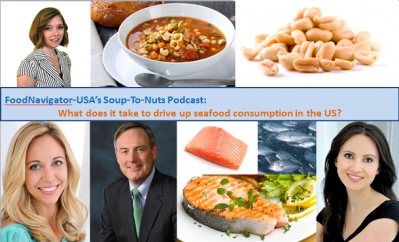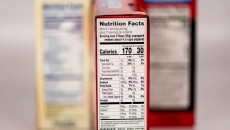Americans eat fish despite mercury fears, says study
in seafood, but this has not prevented them from omitting fish from
their diets, says a new report.
According to findings from consumer and retail information company the NPD group, consumers remain "pushed and pulled" about the health risks and benefits of consuming fish.
Faced with a multitude of conflicting information, "Americans are presumably quite confused about how to manage fish intake in their diets," said NPD.
On the one hand, consumers are warned about the dangers of high levels of mercury in fish, particularly in tuna, something that primarily impacts pregnant women as it can cause serious damage to the development of a fetus.
On the other hand, fish has long been considered a good source of protein and omega-3 fatty acids, and is considered to help raise 'good' cholesterol and lower the risk of cardiovascular disease.
The debate has turned into a long running battle between consumer groups, scientists, the Food and Drug Administration (FDA) and industry, all of whom cite various studies as supporting either a position that high levels of mercury are turning up in canned tuna, or that the traces found are not harmful to health at all.
The claims and counter-claims over the scientific evidence have led to confusion in the marketplace, with the ultimate risk of a reversal in the relatively stable demand in the US for tuna and other seafood.
But according to the NPD group, 67 percent of consumers are aware of mercury in seafood, yet 28 percent of fish-eaters say they plan to eat more of it in the next month.
"Although we are seeing that consumers are aware and concerned about the mercury in fish issue, they are not deterred from eating more of it," said Kristin Nickels, product manager of NPD's Food Safety Monitor and Dieting Monitor.
"It is clear that Americans are experiencing mixed messages about whether or not they should include fish in their diets," she added.
And the confusion has led to the industry increasingly coming under attack. Much of the recent pressure has occurred in California, where the state attorney general, Bill Lockyer took five grocery stores to court in a bid to get them to post warning labels on fish that may have levels of mercury in them. The lawsuit was filed under Proposition 65, the voter initiative that requires businesses to alert the public they are being exposed to dangerous chemicals.
But the industry in turn is not facing the fire in silence.
Indeed, a recent three-part series of reports by the Chicago Tribune on the issue came under attack from the tuna industry. The reports claimed that tests conducted on the paper's behalf by Rutgers University showed dangerous levels of mercury in canned tuna.
But the Tuna Foundation turned the study on its head, claiming that the Rutgers tests in fact confirmed that mercury levels in the canned version of the fish are below the "very conservative limit" set by the FDA.
The association's executive director cited a recent study by the Harvard Center for Risk Analysis, which claimed that the health benefits of consuming seafood far outweigh any risk due to trace amounts of mercury in fish.
The study, which was published in the November 2005 issue of the American Journal of Preventive Medicine, claimed that if Americans reduce their fish consumption out of confusion about mercury, there will be serious public health consequences, notably higher death rates from heart disease and stroke.
All types of fish contain some amounts of mercury. For most people this is not a cause for concern, but a build-up in the blood stream can lead to reproductive problems in women and affect the development of the nervous system in children.
The FDA therefore advises that people eat up to 12 ounces (two average meals) a week of fish and shellfish that are lower in mercury, such as canned light tuna, salmon, pollock, and catfish.
As albacore tuna and fresh tuna steaks contain more mercury than light tuna, the agency says that consumption of this variety should be limited to 6 ounces per week.














